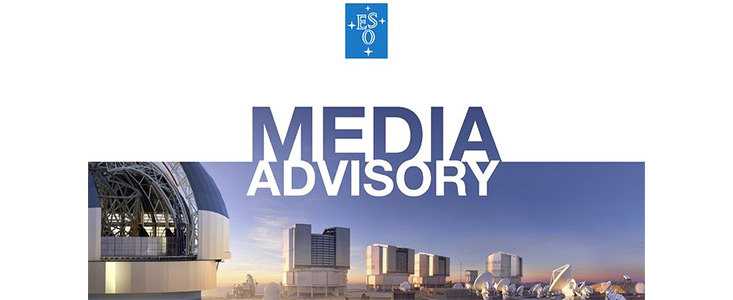Annuncio
Annuncio per la Stampa: Conferenza stampa sui primi risultati di EHT
01 Aprile 2019
La Commissione Europea, il Consiglio europeo per la Ricerca e il progetto EHT (Event Horizon Telescope) terranno una conferenza stampa per presentare un risultato rivoluzionario da parte dell'EHT.
- Quando: il 10 aprile 2019 alle 15:00 CEST
- Dove: La conferenza stampa si terrà presso l'edificio Berlaymont, in Rue de la Loi (Wetstraat) 200, B-1049 Bruxelles, Belgio. L'evento sarà introdotto dal Commissario europeo per la ricerca, la scienza e l'innovazione, Carlos Moedas; seguiranno le presentazioni dei ricercatori che hanno ottenuto questo risultato.
- Cosa: una conferenza stampa per presentare un risultato rivoluzionario dall'EHT.
- Chi: L'introduzione di Carlos Moedas, Commissario Europeo per la Ricerca, Scienza e Innovazione sarà seguita da un intervento di Anton Zensus, presidente del comitato di collaborazione EHT, che quindi introdurrà un panel di ricercatori EHT per spiegare il risultato e rispondere alle domande:
- Heino Falcke, Radboud University, Nijmegen, Paesi Bassi (Presidente del Consiglio Scientifico dell'EHT)
- Monika Mościbrodzka, Radboud University, Nijmegen, Paesi Bassi (Coordinatrice dei Gruppi di Lavoro dell'EHT)
- Luciano Rezzolla, Goethe Universität, Frankfurt, Germania (Membro del Comitato dell'EHT)
- Eduardo Ros, Max-Planck-Institut für Radioastronomie, Bonn, Germania, (Segretario del Comitato dell'EHT)
- RSVP: l'invito è rivolto ai rappresentanti dei media. Per partecipare alla conferenza, i membri della stampa devono registrarsi compilando un modulo online entro il 7 aprile 23:59 CEST. Si prega di indicare se si desidera partecipare di persona o se si parteciperà solo online. I giornalisti sul posto avranno accesso a una sessione di domande e risposte con i membri del panel durante la conferenza. Saranno anche possibili interviste individuali di persona subito dopo la conferenza.
La conferenza sarà trasmessa online sul sito web dell'ESO, dall'ERC e sui social media. Accetteremo alcune domande dai social media per mezzo dell'hashtag #AskEHTeu.
Un comunicato stampa dell'ESO verrà rilasciato pubblicamente poco dopo l'inizio della conferenza alle 15:07 CEST. Le traduzioni del comunicato stampa saranno disponibili in più lingue, insieme ad ampio materiale audiovisivo di supporto.
Sei importanti conferenze stampa si terranno simultaneamente in tutto il mondo in Belgio (Bruxelles, in inglese), Cile (Santiago, in spagnolo), Shanghai (in mandarino), Giappone (Tokyo, in giapponese), Taipei (in mandarino) e Stati Uniti d'America (Washington, DC, in inglese).
Il Commissario europeo per la ricerca, la scienza e l'innovazione, Carlos Moedas, interverrà a Bruxelles, il presidente dell'Accademia Sinica, James Liao, parlerà a Taipei, il direttore di ALMA Sean Dougherty e il Direttore Generale dell'ESO Xavier Barcons saranno a Santiago, e il Direttore dell'NSF France A. Córdova parlerà a Washington DC.
Data l'importanza di questo risultato, incoraggiamo l'organizzazione di eventi satellite nei diversi Stati membri dell'ESO e oltre. Se desiderate organizzare un evento satellite, contattate Katharina Königstein (k.konigstein@astro.ru.nl) per i dettagli sulla trasmissione dal vivo. Eventi satellite sono già in programma a Madrid, Roma, Göteborg, Nijmegen e Pretoria.
Per ulteriori informazioni e aggiornamenti, si prega di consultare anche la pagina Web di Event Horizon Telescope all'indirizzo https://eventhorizontelescope.org.
Ulteriori informazioni
I membri della stampa, compresi i media e le emittenti online, possono iscriversi per ricevere la newsletter per la stampa dell'ESO. Di solito, questa contiene i comunicati stampa dell'ESO inviati circa 48 ore prima della diffusione pubblica, oltre agli ultimi video e filmati dell'ESO, disponibili per l'uso in documentari, film, video, ecc. Per iscriversi alla newsletter per la stampa dell'ESO, si prega di compilare questo modulo.
Links
Riguardo all'annuncio
| Identificazione: | ann19018 |

